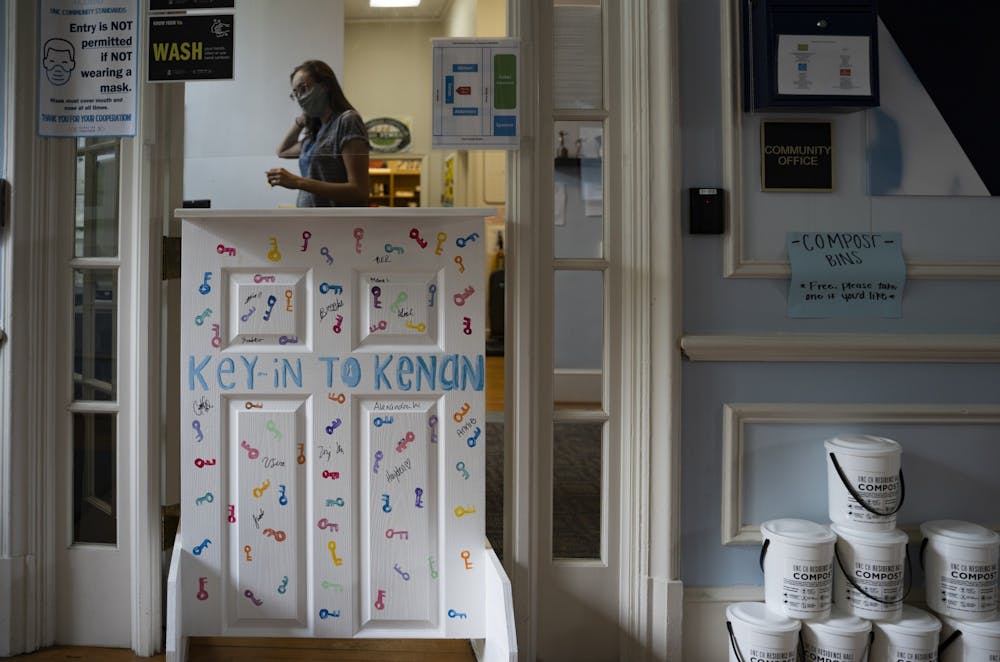“To them, I’m sure that money is nothing,” Silva said. “But to me, that goes towards me paying that money back to the University.”
Silva is an RA in Spencer Residence Hall, one of the buildings closing down as part of Carolina Housing’s consolidation effort. In order to continue getting paid until Oct. 30, she has to remain on campus before returning home.
“So if I want to go home, first I have to move into a new dorm, wait that out, and then I can move again,” Silva said. “And it just feels really inconsiderate.”
In the termination email, Carolina Housing said the decision came from evaluating multiple options and following these guiding principles:
- "Ensuring the most support possible for our student employees, given our current financial situation,"
- "Offering student employees as much notice as possible, so you can make informed decisions about next steps without fear of having to pursue alternate housing urgently" and
- "Allowing us a period of several weeks to work with students for whom this decision will create a severe hardship, in order to assess how we may mobilize available campus support resources."
According to guidelines in a July 21 document from former UNC System interim President Bill Roper, chancellors are authorized to enact temporary salary reductions for University employees who are exempt from the State Human Resources Act — which include faculty, research and instructional personnel and senior officers of the University.
At the time of publication, UNC had not made decisions about temporary salary reductions for non-athletic University officials.
Now, as Silva is trying to navigate moving out and the uncertainty of her job, she has had to help residents who have been going through similar experiences since the beginning of the semester. But it’s hard, she said, without having all of the information and answers to questions from Carolina Housing and the University.
“I feel useless,” Silva said. “I can’t do my job, I can’t do what I love about this job so much, because they won’t let me.”
Even with the uncertainty coming into this school year, Silva wanted to come back as an RA to help students through their living experience.
But that experience was short-lived. Silva said she had residents moving out and student staff members she knew quitting as COVID-19 clusters emerged on and around campus.
“They shouldn’t have brought us back to begin with, to make us go through all that training, getting all the communities ready for opening,” Silva said. “So much work goes into welcoming people back to UNC in the fall.”
To get the day's news and headlines in your inbox each morning, sign up for our email newsletters.
Though Silva’s time with her residents wasn’t long, she still tried to get to know them. Earlier this semester, she sat spaced out in a hallway, with a mask on, to start building community with her residents.
“Having that not reflected in the higher-ups is so frustrating, to have the people in control making our decisions not care about us,” Silva said.
Like Silva, other Carolina Housing student staff feel uncertain of the future.
“My managers and the community director have been really transparent with us, with what the housing concerns are,” said a Carolina Housing office assistant, who has asked to remain anonymous due to future employment concerns. “But it seems like their hands are tied as well, so what kind of information they know. I feel like a lot of the decision-making is really happening from a top-down hierarchical structure.”
As each email from the University changes aspects of Silva's life, she isn't sure what work will look like from here until October, or whether she'll have a job next semester.
“It’s just always pulling the rug out from under us,” Silva said.
Consolidation efforts
The decisions about which residence halls to close and which to keep open and reassign students to were based on occupancy numbers, Carolina Housing Executive Director Allan Blattner said. Carolina Housing worked with the Orange County Health Department to establish the consolidation plans.
“Both because we wanted to inconvenience as few students as we can, but also try and get them out of those really low occupancy areas,” he said.
Students who are currently sharing a bedroom with a roommate are required to move to a single room or to confirm with UNC that they wish to remain with a roommate.
“(OCHD) really thought it was important, as did we, that students, if they’re going to have a roommate or a suitemate, acknowledge that person may or may not adhere to the same standards that you do," Blattner said. "That was certainly noticeable in the early part of the fall semester, so we wanted them to know that.”
In an interview with The Daily Tar Heel on Wednesday, the day before Carolina Housing emailed student staff about their termination, Blattner said they were still “up in the air” about the plans for employees after consolidation. Whether or not student staff members stay in their positions, they will still be able to live on campus at the same current rate, he said at the time.
“They didn’t have to go through the hardship process and those kinds of things because they are a part of the Housing team and part of the Housing family and we wanted them to feel like they had a place,” Blattner said.
In a request for a follow-up on the termination of student employees, UNC Media Relations said in an email, “The letter to students is all the information we have to provide at this time.”
@praveenavsoma
university@dailytarheel.com




